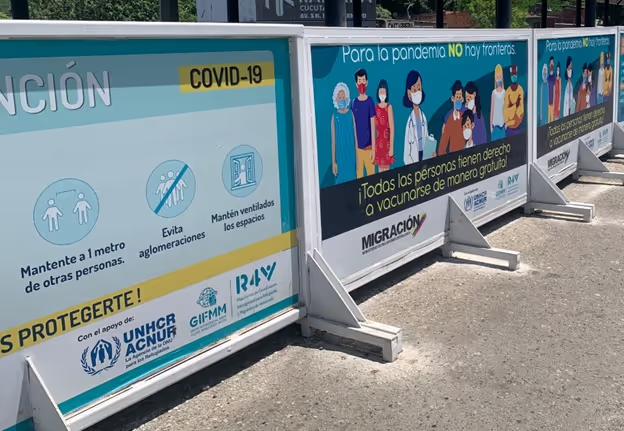Health System Strengthening to Reduce Morbidity and Mortality for Women and Children Venezuelan Migrants in Colombia

Project overview
This study assessed the impact of Colombia’s Estatuto de Protección Temporal para Migrantes Venezolanos (ETPMV) policy on enrollment into the health system and access to health services among Venezuelan migrant women and children in Colombia, and identify facilitators and barriers to addressing healthcare needs.
Project solution
This project offers [specific solution or intervention] to tackle [challenge]. By implementing [strategies, tools, or innovations], the project aims to achieve [desired outcomes]. The approach is designed to [specific actions or methods] to bring about meaningful change in [community, region, or issue area].
Expected outcomes
This project aims to achieve [specific outcomes], such as [measurable results, improvements, or changes]. The expected impact includes [benefits to the target community, advancements in research or innovation, or long-term effects]. By the end of the project, we anticipate [specific changes or milestones] that will contribute to [broader goals or objectives].
Principal Investigator: Diana Bowser
Research Snapshot: Legal status and healthcare access for Venezuelan migrant women in Colombia
The ETPMV (which expired in 2024) successfully increased enrollment of Venezuelan migrant women in Colombia's health system by about 134% from 2020 to 2023, but health service usage declined, suggesting limited access despite enrollment.
[.cta_link]Read the Snapshot[.cta_link]
What did the study set out to achieve?
Colombia hosts approximately 2.8 million Venezuelan migrants. About 80% of migrants have obtained or are in the process of obtaining regularised legal status through a Colombian Government policy (the ETPMV) implemented in 2021. Once regularised, migrants can access a range of public services and can enroll in healthcare insurance through one of several public insurance schemes (until 2030).
The aim of this research was to assess the impact of the ETPMV on enrollment into the health system and access to health services among Venezuelan migrant women and children in Colombia and identify facilitators and barriers to addressing healthcare needs.
This mixed-methods research comprised quantitative analysis of secondary administrative data, a telephone survey with 4,423 Venezuelan migrant women in 2020 and 2023, and qualitative interviews with Venezuelan migrant women across Colombia to examine healthcare access and use after the ETPMV. A Municipal Enrollment Index (MEI) was created, using administrative data to capture migrant regularisation and health insurance enrollment.
What were the key findings?
- There was a substantial increase in the number of Venezuelan women in Colombia between 2017 and 2019, and again after the pandemic between 2021 and 2023.
- Migrant women are 134% more likely to be enrolled in insurance in 2023 compared with 2020, before the ETPMV.
- Having insurance after the ETPMV was found to improve access to healthcare, including at both public and private facilities, compared to those without insurance. Insurance protected against declining health service use patterns nationwide.
- Having insurance was found to be particularly important for accessing healthcare in municipalities with low MEI scores.
- Health brigades, NGO-supported healthcare services, use of emergency departments, and use of community networks facilitated access to care. Legal and administrative barriers, financial constraints, lack of information, unstable living conditions, and experiences of discrimination reduced access to healthcare.
What does this mean for policymakers and practitioners?
The ETPMV presents a positive example of how policies can facilitate access to healthcare in humanitarian crises caused by mass migration. However, additional policies and strategies will be needed to improve access to healthcare and help address high-priority health concerns affecting the Venezuelan migrant population, such as maternal morbidity. Without such efforts, delayed or missing treatment will continue to contribute to preventable complications and avoidable deaths, worsening health inequities among this vulnerable population.
Recommendations to improve healthcare access and outcomes for Venezuelan migrants include:
- Strengthening regularization processes, such as the ETPMV or another stable and inclusive regularization mechanism.
- Improving ease of health insurance enrollment, particularly for vulnerable and high mobility populations.
- Training healthcare workers in pathways to healthcare for migrants and in non-discriminatory practices.
- Expanding sexual and reproductive health services to ensure equitable care, such as family planning services and postnatal care.
- Including nationality data in national databases to allow health outcomes of Colombian and Venezuelan populations to be monitored and compared.
Project delivery & updates
Stay up to date with the latest developments from this project. Here, you will find details on what has been delivered, resources created, and regular updates as the project progresses. Access key documents, reports, and other materials to see how the project is making an impact.
Resources
Article
LEARN MOREPolicy brief
LEARN MOREResearch snapshot
LEARN MORE

